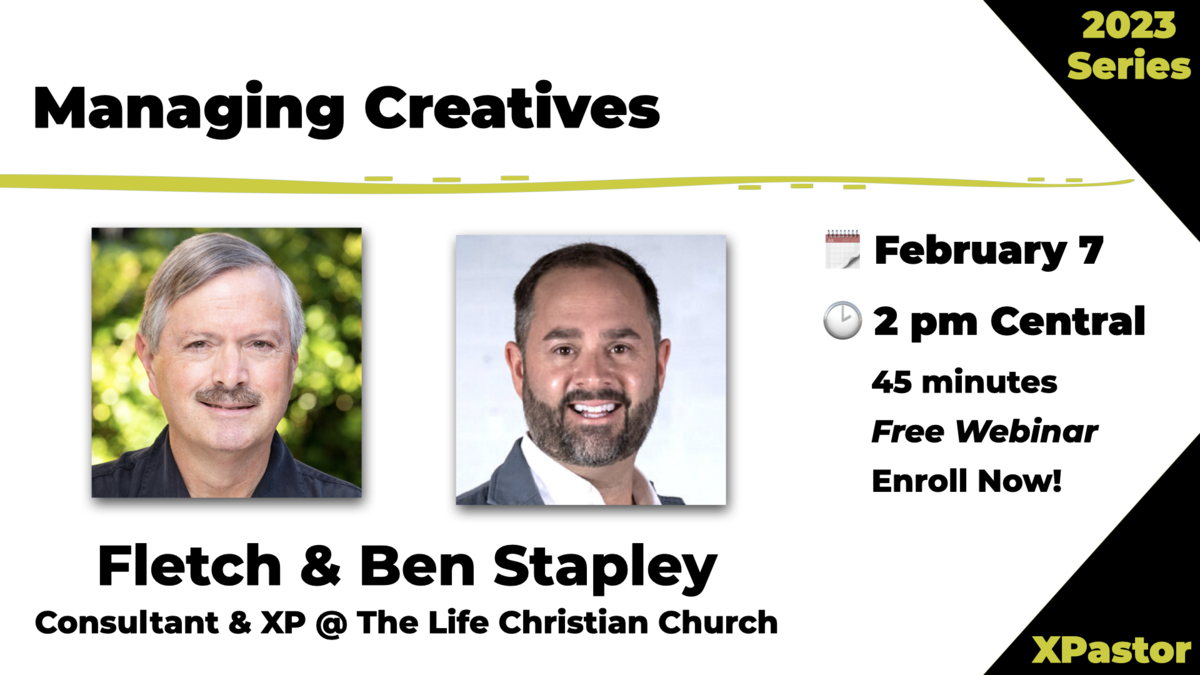XPastor tries to help churches by providing some of the essentials for running a church—items like job descriptions, employment applications, review forms and church policies. Below are the Personnel Policies from Central Baptist Church of Hixon, Tennessee.
A. Personnel Positions
An agreement between personnel and CBCH is entered into at the time of employment. Personnel positions at Central Baptist Church of Hixson (CBCH) are classified as follows:
Ministerial (M)—Ministerial employees, whether full-time or part-time. An agreement between M personnel and the church is entered into at the time of employment. The agreement shall stipulate the amount of salary, vacation, sick leave, housing allowance, benefits, number of revival meetings annually in other churches, and define any other working arrangements agreed upon.
Professional (P)—Full-time salaried personnel positions in a professional area. An agreement between P personnel and CBCH as approved by the Personnel Committee defines working arrangements and financial obligations of the employee and the church.
Administrative (A)—Full-time salaried personnel positions in assistance to M or P personnel. An agreement between A personnel and CBCH as approved by the Personnel Committee defines working arrangements and financial obligations of the employee and the church.
Secretarial (S) or Clerical (S)—Full-time salaried personnel positions in the clerical and secretarial area.
Maintenance and Custodial (C)—Full-time salaried personnel positions.
Part-Time Salaried (PS)—Regular part-time salaried personnel positions.
Part-Time Hourly (PH)—Regular part-time hourly personnel positions.
Temporary Hourly (TH)—Hired for a limited time to do a specific job.
B. Personnel Employment Procedures
Responsibilities for employment procedures are assigned to the Executive Pastor of Ministries and the Personnel Committee. If the position being filled falls under the supervision of certain staff member(s), then that staff member(s) will serve as adjunct member(s) of the Personnel Committee and make recommendations accordingly.
All applications for employment must be made on the Employment Application Form as provided by the church. Included with this application should be a minimum of three (3) references which the Personnel Committee must be able to reach by telephone. All applications from interested persons shall be accepted and evaluated.
Recruiting sources for personnel of the church will be through announcement to staff members, newspaper advertisement and/or professional publications featuring church staff personnel. The responsibility for implementation of recruitment of church personnel is with the Executive Pastor of Ministries and Personnel Committee.
Prior to finalization and completion of the employment procedure for M and P personnel, the Personnel Committee will offer a church approved written offer to the potential candidate. This offer will define financial obligations of the church, the employee’s responsibilities to the church, as well as working hours, use of sick/annual leave and professional leave (for revivals, workshops, conventions, etc.) This offer will become the agreement between the employee and church.
Prior to finalization and completion of the employment procedure for A, S, C, PS, PH personnel, the potential employee will be granted an opportunity for employment of ninety (90) days. During this 90-day introductory period of employment, the potential employee will be evaluated by his/her supervisor(s) and the Personnel Committee. If after the 90-day introductory period has ended, the potential employee and the church mutually agree on employment terms, then the potential employee will become a full-time employee with all privileges and benefits as defined by this manual.
Employment is with mutual consent of the employee and the church, and either the employee or the church has the right to terminate the employment relationship at any time, with or without cause or advance notice.
C. Job Descriptions
Job descriptions are prepared for every position on the payroll. Job classification and assignments are analyzed by the Senior Pastor, Executive Pastor of Ministries and the Personnel Committee to insure that duties and responsibilities do not overlap and that the most efficient distribution of work is occurring.
D. Employee Discipline
- The church recognizes that employee discipline may become necessary. This policy shall apply to all employees (M, P, A, S, C, PS, PH, TH). Discipline shall be applied for the following reasons:
- Incompetence or dishonesty in performance of ministries or other duties contained in the job description. This includes poor attitude toward supervisor(s) and the work to be done.
- Willful failure to perform the duties and responsibilities for which the staff member was employed, or refusal to comply with the policies of the church, or to carry out specific assignments when such policies and assignments are reasonable.
- Conviction of a crime or felony involving moral turpitude.
- Use of narcotics or intoxicants, unless prescribed by a medical doctor and taken under his supervision.
- Capricious disregard of accepted standards of professional and Christian conduct.
- Falsification of information on an employment application or other information concerning qualifications of employment.
- Failure to maintain the level of professional excellence and ability required by the position.
- Divulging of confidential or personal information acquired because of the position held in the church.
- The following procedure will be used when it becomes necessary for an employee’s supervisor to discipline an employee:
- There should be an initial discussion of the problems between the employee and his/her immediate supervisor. The supervisor should document this discussion and place it in the supervisor’s file, not the employee’s permanent file. This document should indicate the employee’s signature. If the employee refuses to sign, the supervisor should discuss this with the Senior Pastor or the Executive Pastor of Ministries.
- If the problem is not corrected immediately, a discussion of the problem between the employee and his/her immediate supervisor should occur again. This discussion should include the following:
- Details of problem
- Future expectations
- Employee understanding of problem and commitment to resolve the problem
- Employee reaction
The entire conversation should be documented and dated and the employee given an opportunity to read and sign. Copies of the report should be distributed as shown below to insure all appropriate people are being uniformly updated concerning the problem:
-
Executive Pastor of Ministries
-
Personnel Committee
-
Employee
This documented discussion may be repeated if appropriate by the supervisor based on progress, time lapse, or severity of problem. If the problem is not resolved within a time frame agreed upon by the supervisor and employee, further disciplinary steps must be taken.
- If the problem continues, the immediate supervisor will discuss the problem details, previous actions taken, and future expectations with the Personnel Committee and make recommendations for resolution.
- A recommendation for termination will be supported by the Personnel Committee only after:
- A complete review of the case has been made, including problem details, disciplinary actions taken, and employee reaction. (This may include a discussion between the Personnel Committee and employee if felt it would be helpful to the Personnel Committee).
- Confirmation of proper documentation of the case and opportunity for the employee to resolve the problem without discharge.
- The employee has been given an opportunity to discuss the problem with the Personnel Committee and/or another appropriate staff member.
- A recommendation for termination will be supported by the Personnel Committee only after:
- Once a recommendation for termination by the immediate supervisor is supported by the Personnel Committee, the immediate supervisor will meet with the employee and inform him/her of the termination decision, reasons, and any agreements related thereto. This conversation will be documented and distributed as shown in number 2 above.
- Normally two weeks of severance pay will be given, but the decision as to whether or not to grant severance pay will be the responsibility of the Personnel Committee. Severance pay is not automatically extended to a terminated employee. Examples of refused severance pay would include employees dismissed for dishonesty or chronic absenteeism.
E. Working Hours
The normal working day for all church personnel (P, A, S, C, PS) is 8:30 a.m. to 4:30 p.m. Certain positions may require different schedules as assigned by the Executive Pastor of Ministries and the Personnel Committee. The days of the week on which work attendance falls is specified at the time of employment by the Personnel Committee and the pastor.
Although individuals may have different schedules, everyone is required to work forty hours a week. Lunch breaks will be one hour.
Each employee is expected to be on time for all scheduled working hours. He/she is expected to stay on the job until the scheduled ending of a work day. In the event of inclement weather (snow, ice, etc.), the employee is advised that if the Hamilton County Schools close, he/she should report to work by 10:00 a.m., unless he/she receives a phone call stating that the office will be closed. In the event of inclement weather occurring while employees are on the job, the pastor or his appointed representative will make the decision as to when employees are to leave prior to the normal ending (4:30 p.m.) of a work day.
The difficult, but immeasurably rewarding task of providing the most consideration for meeting the needs of church members and other persons, may require employees to extend their work day beyond that of the normal work schedule. This is an integral part of the responsibilities of church staff personnel and will be expected when needed. Extended work day time may be taken as compensatory leave (See Section F.8), or maybe compensated by overtime pay in accordance with state and federal law. However, overtime may not be worked unless approved in advance by the supervisor.
F. Personnel Leave
If a member of the church Staff must be absent for any reason (temporary or approved), he/she is responsible for informing his/her immediate supervisor(s) or the Executive Pastor of Ministries of the absence.
In the case of an anticipated absence, the employee must inform his/her immediate supervisor. The absence will then be subject to approval by the supervisor. In the event that the absence will be a prolonged one and a substitute or temporary person will be employed, the matter must be approved by the Executive Pastor of Ministries and the Personnel Committee.
Absences of a staff member must be reported on a Leave Request Form and signed by his/her immediate supervisor. Records on accumulation/use of appropriate leave times will be maintained by the Executive Pastor of Ministries.
1. Funeral Leave
In the event of death in the immediate family of an employee up to four (4) days can be taken. More days may be granted upon request of the employee pending approval of his/her immediate Supervisor, Senior Pastor or Executive Pastor of Ministries. The immediate family in this instance is to include the following: spouse, child, parent, parent-in-law, grandparent, grandchild, son and daughter-in-law, brother and sister-in-law, foster brother, foster sister, and other members of the family who reside in the home of the employee.
2. Sick Leave
i. Accrual of Sick Leave
The church sick leave plan provides that without cost to each employee, 1⁄2 day (4 hours) of sick leave will accrue to each full time regular employee’s accumulated sick leave for each 2 week pay period of employment. The total amount of sick leave accrued in one year is not to exceed 13 days. The maximum accumulation of sick leave is 30 working days.
Sick leave begins to accumulate from the date of employment as a regular full-time employee and can begin to be used following completion of one (1) month full-time continuous service. Employees do not earn or accrue sick leave while on leave without pay.
ii. Use of Sick Leave
Sick leave is generally applicable to absence due to injury or illness of an employee, including illness or incapacity to work due to pregnancy and complications thereof, medical examinations, and dental appointments.
Where an employee must be absent because of serious illness in the immediate family (spouse, children, parents, parents-in-law, and other members of the family who reside in the home of the employee), sick leave may be granted by the Executive Pastor of Ministries upon the employee’s request through his/her immediate supervisor.
An employee may be required to present evidence in the form of either a personal affidavit, a physician’s certificate, or other testimonials in support of the reason for sick leave.
When the illness, injury or disability of an employee continues beyond the period of accumulated sick leave, the employee may, at his or her request, use any accumulated annual leave for continued absence. When an employee has exhausted all accumulated sick and/or annual leave, he/she may be placed, if requested, on leave of absence without pay if approved by the Executive Pastor of Ministries and the Personnel Committee.
Maternity leave shall be treated as sick leave. Upon exhaustion of accumulated sick leave and any annual leave as requested by the employee, the employee shall be placed on leave of absence without pay for the remainder of her period of authorized absence. Termination of the period of authorized absence shall occur when the employee again becomes able to carry out her functions. Upon termination of the period of authorized absence, the employee shall be reinstated to her original job without loss of service or benefits if the job is still available. No leave of any type will accrue during leave of absence without pay.
Paternity leave for fathers shall be treated as sick leave.
3. Annual Leave
The accrual of annual leave shall be recorded and kept by the Executive Pastor of Ministries. Annual leave years will run with the calendar year and vacation is based on service time at year-end.
a. Persons with less than one year of employment:
Two week or ten (10) days of annual leave or vacation time will be recorded for the first year of employment.
For those who are employed during the year allowable annual leave will be prorated for that calendar year.
b. Persons with 1 to 9 years of employment:
Two weeks or ten (10) days annual leave or vacation time will be recorded for the second through the ninth year of employment.
Employees are encouraged to use their annual leave/vacation time. The use of annual leave should be discussed and coordinated with the immediate supervisor and the pastor so as not to interrupt the work flow of the church.
Carry over of annual leave from one year to the next will not be allowed, except when the work load in December makes it difficult to use. In this event, one week may be carried over for use in January. Other unused leave is lost if the employee does not elect to use it by the end of December.
If an emergency arises, such that sick leave is not available to the employee, he/she may telephone the immediate supervisor(s) or other designated person and inform them of their absence. Up to one day of annual leave may be taken only in 4 hour or 1⁄2 work day amounts without the permission of the Executive Pastor of Ministries or other designated person(s).
c. Persons with 10 to 14 years of employment.
Three (3) weeks, or fifteen (15) days, of annual leave or vacation time will be recorded for the tenth (10) through the fourteenth (14) years of employment. The use of this annual leave should be discussed and coordinated with the Executive Pastor of Ministries and immediate supervisor(s). Procedures as described under Section b above will apply to use of annual leave accrued during 10-14 years of employment.
d. Persons with 15 or more years of employment
Four (4) weeks, or twenty (20) days of annual leave or vacation time will be recorded for the fifteenth (15) and following years of employment. Procedures as described above will apply.
Summary: Annual Leave
1 Week (5 working days) the first year
2 Weeks (10 working days) the second through ninth (9) year.
3 Weeks (15 working days) the tenth (10) through the fourteenth (14) year.
4 Weeks (20 working days) the fifteenth (15) and years following.
4. Annual Leave for Ministerial (M) and Professional (P) Personnel
Annual leave of the Ministerial and Professional personnel is described in the employment offer between M and P personnel and the Personnel Committee of the church. The use of this annual leave should be discussed with the Senior Pastor or Executive Pastor of Ministries so as not to interrupt the work of the church.
Carry over of annual leave into succeeding years will not be allowed. Unused leave is lost if the employee does not elect to use it by the end of the next calendar year.
Any deviation from the employment offer/agreement must be approved by the Personnel Committee.
5. Separation of Employees with Accrued Annual and/or Sick Leave
Upon termination of employment by M, P, S, C, PS personnel, accumulated or unused sick leave shall not be used as terminal leave nor will any financial remuneration be made for unused sick leave.
Upon termination of employment by M, P, S, C, PS personnel, accumulated or unused annual leave will be paid.
6. Civil Leave
Employees are encouraged to cooperate in citizen responsibilities.
When in obedience to a subpoena or direction by proper authority, an employee appears as a witness for the Federal Government, the State of Tennessee, or when he/she attends any court in connection with his/her official duties, or serves on a jury in any State or Federal Court, he/she shall be granted civil leave. Civil leave shall not be charged as annual leave.
For the period an employee is eligible for civil leave and renders jury service or serves as a witness should be entitled to regular compensation and travel expenses. However, an employee may elect to use his/her annual leave rather that civil leave.
7. Leave Records
Adequate leave records shall be maintained for all employees. Records must show the beginning date of employment (whether on part-time or full-time status), the years of service of employees for annual leave accrual purposes, and the accumulation of sick and annual leave for purposes of transfer and/or termination.
Leave records shall be made available to the Executive Pastor of Ministries or appropriate personnel for church purposes.
The records for each employee shall be available to the employee upon request.
8. Paid Holidays (M, P, A, S, C)
The church offices are normally closed in observance of the following holidays:
- New Year’s Day
- Good Friday
- Independence Day (July 4)
- Labor Day (First Monday in September)
- Memorial Day
- Thanksgiving Day and the Friday thereafter
- Christmas Eve and Christmas Day
When a holiday falls on Saturday or a scheduled off day, the day preceding the holiday may be substituted. When it falls on Sunday, the Monday following the holiday may be substituted.
The paid holiday policy does not apply to employees on leave or absence without pay.
The Executive Pastor of Ministries or his designee replacement in his absence may alter dates and staff work schedules in order to maintain operational requirements.
9. Compensatory Leave
It is the policy of the church to provide compensatory time off to compensate for those unusual times when it becomes necessary to work more than the scheduled weekly hours.
Work during the week of more hours than scheduled should be undertaken only with the knowledge and consent of the immediate supervisor. Accumulated compensatory time must be used before the end of the pay period in which it was incurred.
10. Personal Leave
One (1) day of personal leave may be taken during the calendar year with full compensation. This day may be used at any time with prior approval from immediate supervisor.
11. Leave With Pay
Leave with pay may be requested by an employee in writing to their immediate supervisor. All LWP must be approved by the Senior Pastor or Executive Pastor of Ministry and Personnel Committee. Leave with pay will be granted on an individual basis when extenuated circumstances are present.
G. Employee Benefits
1. Professional Personnel
Benefits available to personnel of the ministerial and professional classification are described in the agreement between M and P personnel and Personal Committee of the church. Any deviation from this agreement must be approved by the Personnel Committee.
2. S, C, Personnel
a. Medical Insurance
The church will provide a group medical plan for all full-time regular employees (S, C), provided the insurance carrier will grant coverage. The type of coverage an employee receives will be the result of his/her choice and the plan available. The church shall pay the premium and the employee is expected to pay for their family members if they wish to cover them.
Full-time employees have the option of accepting individual medical insurance coverage (if insurable) or applying the funds budgeted for medical insurance to the Southern Baptist Annuity Retirement Plan. The amount contributed is limited to the maximum contribution permitted by the Annuity Board.
b. Life and Disability Insurance
All secretarial and/or custodial (S, C, PS) employees can elect to be covered under the life and disability insurance plan of the Annuity Board of the Southern Baptist Convention, provided the insurance carrier will grant coverage. The church will pay the premium for a $10,000 policy and the disability coverage. Additional life insurance coverage may be elected and paid for by the employee.
c. Social Security
All employees not deemed ministers for tax purposes shall participate in Social Security contributions upon employment. The church will pay its share and automatically deduct the employee’s share.
The church will contribute ten percent of salary into the retirement plan of the Annuity Board of the Southern Baptist Convention for all full-time annual employees. This is at no cost to the employee. Part-time church employees are eligible to participate in the Annuity Board Retirement Plan, but they must make their own contributions through payroll deduction, without any additional contributions from the church.
The above employee benefits are designed to help and protect the employee and the church. Therefore, these benefits are always over and above base salary and can never be considered a part of the cash remuneration paid by the church. An employee cannot take cash equivalent in the place of benefits.
These policies will not lessen coverage of previously employed persons nor will any previously employed person suffer the loss of any accrued vacation time or benefits.
H. Sexual Harassment
Central Baptist Church will not tolerate sexual harassment of employees. A valid complaint of sexual harassment will lead to appropriate and strict disciplinary action, including possible termination of employment.
Sexual harassment involves not only unwelcome touching and demands for sexual favors, but also any unwelcome sexually-oriented behavior or comments which create a hostile or offensive work environment.
Examples of sexual harassment include:
- Unwelcome sexual flirtations, advances, or propositions
- Verbal abuse of a sexual nature
- Subtle pressure or requests for sexual activities
- Unnecessary touching of an individual
- Graphic comments about an individual’s body
- A display in the workplace of sexually suggestive objects or pictures
- Sexually explicit or offensive jokes
- Physical assault
Sexual harassment from supervisors, co-workers, or others who visit the church should be reported immediately to the Executive Pastor of Ministries or to the Senior Pastor.
View original PDF of Personnel Policy and 45 Job Descriptions: Personnel Policy:











